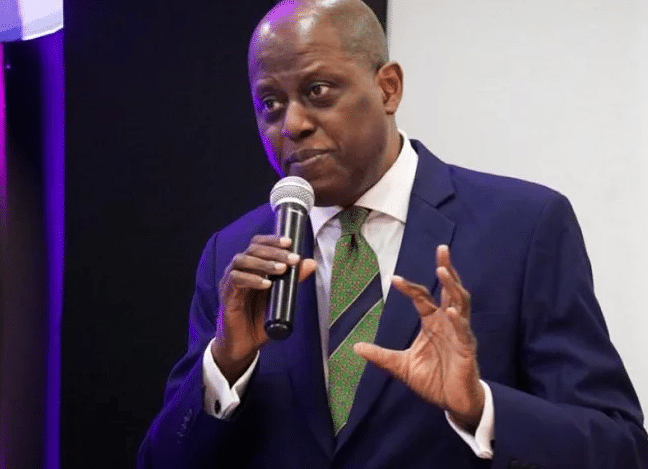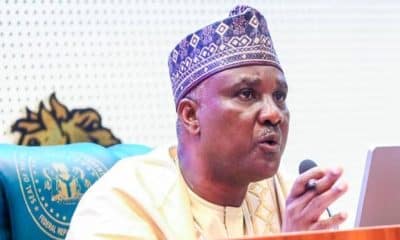Business
From Experiment To Experience: Why the Nigerian Central Bank Needs Its Traditional Navigators Back, By Chibuikem Ugo-Ngadi

Commerce Takes the Central Helm
If you’re tuning into this, you’re likely aware of Yemi Cardoso becoming the new chief of the Central Bank of Nigeria (CBN). His appointment, following Godwin Emefiele’s exit, is notable for another reason: both are commercial bankers, and their leadership comes at a pivotal moment for our economy.
For those who’ve journeyed with my earlier piece, ‘A Call To Action,’ I won’t delve into the detailed statistics again. However, to give you the big picture, our economy is on shaky ground. The naira’s value keeps dwindling, now taking over N1000 to match a single USD. The task of steadying this precarious situation leans heavily on the decisions and actions of the CBN and its helm.
While the trend of appointing commercial bankers to lead the CBN brings forth concerns, it’s not a question of their competency in the banking sector. They excel there. However, piloting the Central Bank has its own set of challenges distinct from commercial banking. The differences and intricacies of central banking are profound, and that’s where my reservations come into play.
Different Worlds
At first glance, central banks and commercial banks might seem to operate within the same realm – the financial sector. However, their mandates, operational scopes, risk management practices, and utilised tools delineate two distinct worlds.
Mandate:
Central banks serve a broader public interest. Their primary objective is maintaining economic stability for the nation. This means they work to control inflation and ensure steady economic growth. On the other hand, commercial banks are primarily business entities. Their driving force? Profit. They focus on attracting customers, granting loans, and providing other financial services to ensure their bottom line grows.
Scope of Operation:
Central banks have a wide lens, monitoring the entire economy. They pay close attention to various economic indicators and global trends to make informed decisions that impact the nation. Commercial banks, however, operate on a more individualized scale. They cater directly to their customers, whether individuals or businesses, offering services that respond to specific financial needs.
Risk Management:
When central banks think of risks, they’re looking at the bigger picture. They’re concerned about large-scale economic threats that can affect the whole country. Commercial banks, in contrast, handle risks that directly impact their day-to-day operations. This includes managing potential loan defaults or keeping up with shifts in the market.
Tools and Mechanisms:
Central banks use tools meant for guiding the entire economy. They employ methods like adjusting the amount of money in banks or setting key interest rates to influence economic conditions. Commercial banks, however, use their tools in a more direct manner. They decide on loan interest rates, offer deposit schemes, and introduce new financial products to attract and serve their customers better.
Navigating Two Worlds: Profit vs. Policy
Merging the distinct worlds of central and commercial banks requires careful consideration. While central banks are dedicated to ensuring national welfare and economic stability, commercial banks have profit as their primary goal. As commercial banking leaders transition into central banking roles, there’s a vital concern: could they inadvertently favour their previous domain?
This is more than just an economic dilemma—it directly influences the trust that the public places in these pillars of finance. Central banks are guardians of our financial health, setting rules to foster a robust economy. In contrast, the profit-driven nature of commercial banks often sees them navigating these rules inventively.
Furthermore, the importance of relationships in the commercial sector can’t be understated, yet central banking demands unwavering impartiality. Introducing a leader from the commercial world might blur the lines of decision-making, raising valid concerns about whether the broader economic interests remain the focal point.
Bypassing Expertise
In the intricate dance of global finance, the choreography of central banking leadership remains crucial. We’ve explored how central and commercial banks dance to different beats. Now, let’s shine a spotlight on Nigeria’s recent break from tradition.
Over the recent years, Nigeria has embarked on what can be termed a ‘recruitment experiment’. The rhythm shifted recently as the trend favoured promoting commercial bankers directly into the central bank’s top role, a distinct departure from traditional appointments. The result: Nigeria’s monetary choreography seems to have missed some crucial steps, leading to disruptions in our macroeconomic performance.
One can’t help but think this isn’t just a twist of fate. While the federal government’s fiscal choreography has certainly added complexity to the central bank’s performance, decisions like the FX Swaps, Naira Redesign Rollout, and Ways and Means Lending resonate as tunes unfamiliar to the seasoned central banking ear. It’s like a skilled ballerina suddenly trying to lead a breakdancing performance.
“Those that are doing it, do they have two heads?” as often quipped in Nigerian households. Globally, it’s a rarity to see a central bank led by someone without deep roots in central banking. While commercial bankers in other countries do occasionally don the central banker’s hat, they usually do so after an extensive apprenticeship in central bank policymaking.
Consider Jerome Powell of the US Fed: his journey from corporate banking and legal practice to the helm of the Fed spanned several years, allowing him to immerse in the central banking culture. Or Andrew Bailey of the Bank of England, whose decades-long waltz within the bank’s corridors prepared him for the top job. Even in emerging economies, leaders like Pan Gongsheng in China and Shakitanka Das in India have risen after extensive experience in their nation’s policy tapestries.
So, while commercial banking insights might offer some flair, nothing replaces the deep, nuanced expertise of a career spent in central banking. As the world’s financial ballet continues, it’s time Nigeria reconsiders its lead dancer.
The Pillars of Traditional Central Banking
Grounded Knowledge in Monetary Dynamics:
Central banking goes beyond mere figures. It’s a complex interplay of strategies, forecasts, and responses. Those who’ve spent their careers in central banking have a hands-on understanding of these complexities. They’ve been in the trenches, navigating global economic shifts, balancing inflation, and setting interest rates. This isn’t just textbook knowledge. They’ve witnessed how policy decisions play out in the real world, equipping them with insights that are tough to replicate.
Objectivity at the Helm:
In the vast world of finance, varying sectors sometimes have clashing goals. Career central bankers stand out with their honed objectivity. Their journey within the policy-centric environment of a central bank ensures they approach challenges without any tilt towards commercial banking influences. This unbiased stance guarantees decisions made prioritize the nation’s overall economic well-being.
Steady Policy Hand:
A stable economy thrives on clarity and predictability. Enterprises, investors, and the general public all benefit when there’s a consistent policy direction. Central bankers, with their repository of past experiences and policy impacts, offer this steady hand. Their decisions aren’t hasty but are rooted in long-term objectives, reducing abrupt policy changes that can disrupt markets.
Built-in Networking:
Years in the central banking sphere mean they’ve forged essential ties. They’ve worked side-by-side with diverse teams, partnered with governmental bodies, and conversed with international peers. These connections are invaluable. When a new policy is on the horizon or when feedback is needed, they have a ready network to tap into, ensuring efficient and informed decision-making.
Charting the Right Course
As Nigeria stands at the precipice of an unparalleled macroeconomic tempest, the actions of the Central Bank in the coming months will either anchor us firmly or leave us adrift. While the allure of shortcuts in policymaking might seem tempting, it’s crucial to remember that the Central Bank isn’t just another institution; it’s our nation’s flagbearer in the global financial arena. It’s our voice, our representative, asserting our place on the world stage.
The Central Bank should be our sanctuary from the pitfalls that often plague Nigerian policymaking. It should be a beacon of steadiness amidst the chaos, guiding our economic ship through tumultuous waters with an experienced hand at the helm.
To mitigate the challenges ahead, it’s imperative we revert to the tried-and-true: placing the keys of the Central Bank in the hands of those who know its every corner, its every nuance. For the health of our nation, the vibrancy of our economy, and the future of our people, it’s high time we return the Central Bank to its rightful stewards: the career central bankers.












